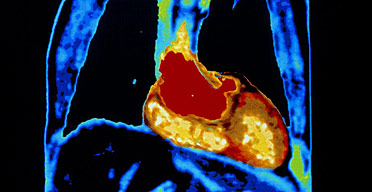
Four out of 10 early heart attacks could be prevented if the partners and relatives of people with heart disease were routinely screened, according to a study in the British Medical Journal today.
Living with or being related to somebody with heart disease is a significant risk factor for heart attack, according to a study. Siblings are twice as likely as most to suffer, but husbands, wives and partners are also in danger.
Blood relatives may have the same genetic triggers for heart disease, but those who share a home probably also share a lifestyle. Smoking, drinking, over-eating and a tendency to watch television rather than go for a jog - all of which may contribute to heart problems - are traits that are likely to run through families.
But researchers Clara Chow, from the Greater Glasgow Cardiovascular Research Centre at Glasgow University, and colleagues say it is not routine to screen the families of heart attack victims in the way that the relatives of people with hereditary cancers are offered advice. "Few studies have examined why relatives are not screened, but lack of public awareness and lack of systems to identify them may play a part," they write.
Premature heart attacks are generally defined as those in men under the age of 55 and women under 65. "If there is a genetic component it tends to kick in earlier," said Jill Pell, one of the authors. "Later it is more of a degenerative condition."
About 29.2 million adults were at risk of premature heart attacks in England and Wales in 2001, according to census figures. In 2004 there were 15,616 hospital admissions for premature heart attack. The researchers estimate from studies that a quarter of this number must have had a family history of heart disease.
According to their calculations, 7,369 people with a family history that should have indicated they were at risk had heart attacks in 2004. If they had been counselled, monitored and, if necessary, given drug treatment, their risk could have been reduced by 88%, they say, and 6,485 heart attacks could have been prevented.
"Thus screening and treating middle aged people with a family history of coronary heart disease could have prevented 42% of premature myocardial infarctions [heart attacks] and 8% of all myocardial infarctions," they write.
They suggest that when middle aged people with heart attacks or serious heart disease come to casualty or an outpatient clinic they should be offered family counselling. Relatives should be identified, counselled and offered screening. They could be given cholesterol and blood pressure tests, offered treatment to stop smoking and given lifestyle advice. If necessary they could be given statins or other drugs to lower cholesterol or blood pressure.
The advantage of this approach, said Prof Pell, is that it does not single out people with just one risk factor - such as high cholesterol - which has not been particularly successful in the past. Instead it aims to find an entire sub-group of the population who are at significantly increased risk and work with them to prevent them getting heart disease in the first place.
The British Heart Foundation was in favour of the idea. "A clear system to invite close relatives of people with premature coronary heart disease for screening could play an important part in preventing heart attacks," said Ellen Mason, a BHF heart nurse. "While there are doctors and nurses in hospitals who encourage visiting relatives to go to their GP surgery to have their risk assessed, often this is not considered a high priority and doesn't happen."

